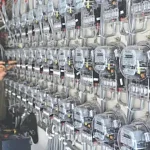ISLAMABAD: The new Haj policy, adopted by the federal cabinet on Tuesday, permits 179,210 Pakistani people to travel to the Hajj next year, with an equal share of quotas for government and private schemes. However, it restricts the ability to bring children under the age of twelve with them.
To help the pilgrims, a new portfolio of Nazim (administration) has been introduced under Haj Policy 2025. Since 1,000 seats will be set aside for hardship cases and 300 for laborers and low-income employees registered under the Employees Old-Age Benefit Institution or Workers Welfare Fund, one Nazim will be designated for every 100 pilgrims, chosen from among the welfare staff.
Prime Minister Shehbaz Sharif presided over the cabinet meeting, where it was announced that a computerized balloting process will be used for selection under the government system. The cabinet demanded that those intending pilgrims who were unsuccessful in the previous year’s voting be given preference.
According to the policy, pilgrims will have access to the Road-to-Makkah service at the airports in Islamabad and Karachi. Additionally, a dedicated Haj Management App has been created to make the pilgrims’ journey easier, and plans have been made for their training.
The cabinet approves the new Haj policy, which prohibits minors under the age of twelve.
The Ministry of Religious Affairs would sign a service provider agreement with the Haj group organizers, which would be closely supervised by the ministry.
The government emphasized the necessity of taking drastic steps to make the pilgrims’ journey easier.
While the injured would receive Rs1 million, the policy has enhanced the compensation for the deceased’s heirs from Rs1 million to Rs2 million.
Additionally, the cabinet authorized the nomination of Muhammad Sajjad Farouqui, Usman Haider, Madiha Khalid, Saeed Iqbal, and Moazzam Ahmed as private members of the board of the Public-Private Partnership Authority.
The agreement to switch the London Interbank Offered Rate for the Foreign Commercial Financing Facility to the Secured Overnight Financing Rate was post facto approved by the cabinet on the suggestion of the finance ministry.
Along with approving a deal between the Directorate General of Ports and Shipping Karachi and the Bahria Classification Society on the certification of ship classification, the meeting authorized the Jammu and Kashmir Estate Property Budget for fiscal year 2024–2025.
Reduced policy rate
In his earlier remarks at the cabinet meeting, Prime Minister Shehbaz praised the State Bank of Pakistan’s policy rate cut to 15% and stated that the government’s efforts to promote economic stability were beginning to bear fruit.
“A further two percent reduction of the policy rate is a pleasing development for business, agriculture, exports, and commerce sectors,” the prime minister told the federal cabinet in his opening remarks.
He stated that by lowering the policy rate progressively from 22 to 25 percent, SBP encouraged people to put their money into the economy in order to boost exports, output, and job creation. According to him, the policy rate cut would free up a significant amount of fiscal flexibility for the nation by reducing the debt load by Rs1.3 trillion. He said he hoped that if the signs kept going in the right direction, the economy would get stronger.
As a follow-up to his recent trip to Saudi Arabia, the prime minister informed the cabinet members that a mission from Pakistan had departed for the kingdom to explore collaboration in solar energy, mining and minerals, and experienced IT workers—all of which Saudi Arabia and Qatar needed. He requested a presentation from the IT ministry on their plan to develop an international-caliber IT workforce.
The prime minister urged quick action on business-to-business (B2B) Memorandums of Understanding (MoUs) with Saudi Arabia and stated that the Azerbaijani government has approved the signing of $2 billion MoUs to improve bilateral relations.
“These are good signals, but it is up to us how we use them,” he continued.
Relief of power
The prime minister emphasized helping the businessmen to improve their morale and made hints about a winter power relief program.
“We are gradually implementing policies to help the average person by generating jobs and managing the economy. It’s a difficult trip, but only the countries that overcome the obstacles will be successful,” he continued.








